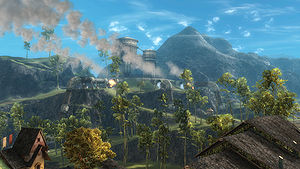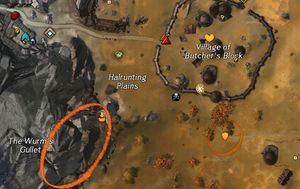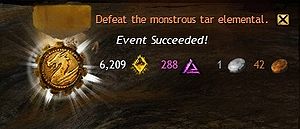Dynamic event
Dynamic events occur in a open world zones as a result of players interacting with and exploring the world. They are called "dynamic" because there are multiple outcomes that also result in new events, creating a cascade effect. Once an event has triggered, it will develop whether or not a player attends it. Because of this, there is no real concept of failure or success – the result of any event will simply cause a change in the surrounding area. For example, if monsters are successful in raiding an area, they may become strong enough to occupy a fort, which could then be re-taken by players.
Events, along with other map completion activities, are designed to replace the traditional concept of MMORPG quests. Players are notified when there is a new event nearby rather than having to look for an NPC with an exclamation mark, for example, over their head. Traditional quests can have consequences that many players find to be negative, such as "spawn camping". The dynamic event mechanic, along with other map completion tasks, were created to prevent these types of issues, by promoting player cooperation instead of competition.
Another problem with the traditional MMORPG questing and exploration system is what might be called kill stealing. In World of Warcraft, for instance, usually only the first player to attack (or "tag") a mob would receive experience and/or loot for the kill, unless the cooperating players are in a party, although even then the experience was only divided among the party members. Guild Wars 2 took the concept to the next level, by rewarding all players that participate in an event 100% of any experience gained, without the need of a party. Likewise, loot is calculated and given to each player that participated, as if they were the only participant. Also, to keep a consistent level of difficulty along with increased participation, event difficulty is scaled dynamically based on the number of active participants. Also note that not all events require combat to complete.
Event mechanics[edit]
Dynamic events are cyclical in nature and often chained together in a series called a "meta-event" (or even just "meta" by the younger generation). They do not necessarily follow a fixed schedule. Many are only triggered (i.e., become active) if certain conditions are met—for example, if a snow storm strikes an area or night falls in a graveyard. Many events are triggered by the presence of a player entering the events' immediate areas. Once an event has been triggered, it will continue to progress whether or not players participate in that event, although in certain instances it might pause if the NPC(s) involved end up being downed, in which case the first action players must take is to revive them.
Although the repetitive nature of events means that consequences are ultimately temporary, the state of some events can persist for days, or even until the next server reset or update, unless players appear and progress the event or event chain.[1] Also, the outcome of some events effect other events, including whether they will even trigger. This adds an amount of variety to the events, another feature of Guild Wars 2 that differs from many MMORPG's. Each event has one or more NPC's associated with it, with whom the player can optionally talk with in order to learn more about the story and lore relevant to the event.[2]
In addition to singular events, several common types of event chains can be observed. One common type of chain progresses linearly and then repeats after a short while. Other, conquest-like battle events, often part of "meta events", occur as well. In these meta-events, players side with an allied faction to fight enemies and attempt to capture one or more locations on the map or take down several (often tough) enemy forces, after which the enemy attempts to take them back, or vice-versa, and succeeds unless enough players are there to participate.
Event states[edit]
Each event is always in one or more "states", and thus can be thought of as finite state machines, in which a computer program, or in this case game event, changes, advancing through various states depending on conditions. While it can be useful to understand the various states, please note that they are mainly used internally by the game engine, and it is not necessary to know them all. Following is a list of the possible states that an event can take:
- Active – The event has been triggered and is currently running.
- Success – The event has succeeded. During this state NPC's may have different dialogs or offer certain services. If the event is part of a chain, additional links of that chain may start within a few seconds.
- Fail – The event has failed. If it is part of a chain, there may not be any following events in the chain.
- Ready – The event is inactive, but will become active once certain criteria are met, such as talking to an NPC (e.g., Ine Duran). In these instances, the NPC will have what looks like a wagon wheel or orange slice icon above his/her head.
- Preparation – The criterion/criteria for the event to start has/have been met, but certain occurrences have not completed yet. After the activities have been completed, the event will become Active. A good example of this is Secrets in the Swamp, which plays prior to Defeat the Shadow Behemoth)
Event participation[edit]
The foremost requirement for triggering an event is to be in the right place at the right time. Events can be discovered in a number of ways, such as exploring the world or conversing with non-player characters. Whenever a player comes within range of a new event, a New Event Nearby notification appears across the screen, along with an event assistant instance on the UI's top right-hand side. In cases where the event occurs above or below the player, for example, on top of a mountain peak or while swimming, a marker is used to indicate whether the event is physically above or below the player's current position. The player's map is also updated with a variety of event-related markers so long as a player stays within the required range. Should a player wander away from the event's location for too long, they will receive a notification stating "Due to inactivity, you are no longer participating in EventName." and will no longer earn event rewards if it is actually completed (by others).
Event indicators[edit]
- Text and event color:
- Orange indicates a dynamic event.
- Yellow indicates a meta event.
- Red usually indicates a harder dynamic or group event.
- Grey indicates the player's inactivity.
- Brushstroke: An event is affecting the encompassed area.
| Icon | Description |
|---|---|
| A specific foe that must be defeated. | |
| A set of foes that must be defeated, usually at the same time. | |
| An object that must be destroyed or protected. | |
| A task involving collecting or gathering. | |
| A variant of a collecting or harvesting event. | |
| A chaotic brawl. | |
| An area that must be held or claimed. | |
| An area or NPC must be protected from harm. | |
| A service or assistance that needs to be provided. | |
| An issue that must be resolved by force. | |
| An object needs to be built. | |
| It is required to talk to an NPC. | |
| Multiple NPCs have to be rescued. | |
| An issue or NPCs have to be investigated. | |
| A fishing tournament. | |
| Events related to Rift Hunting. | |
| The Silverwastes escorts. | |
| Events related to the The Battle For Lion's Arch public instance. | |
| Events related to the Dragon's Stand meta event. | |
| Events related to the Mordant Crescent. | |
| Events in Domain of Kourna. | |
| Events related to portals. | |
| Events related to the Trials of Koda. | |
| Events related to special events. |
Event scaling[edit]
Events scale both up and down according to the number of players who are currently participating. [3] Events can scale in a number of ways:
- Enemy level can be increased
- Enemies can gain new abilities
- New enemy types may appear, including veterans, elites, or even champion versions
- Enemy count can be increased
- Objective requirements may increase
Champion enemies associated with the event will never increase in level due to scaling; this often results in elite foes that are more dangerous than the champions.
Most events scale for up to 10 players.[4] Group events and large scale events such as the finale for meta events will scale much higher. For example, The Shatterer scales up to 100 players.[5]
Events will scale according to the number of players around. Even a player that is not participating will scale the event up. A player that moves away, either by walking or waypointing, will immediately scale the event down.[6]
Group events[edit]
Separate from event scaling, Group Events are different in complexity and/or difficulty from other events of the surrounding area. Group Events are listed in the event assistant with "[Group Event]", and like other events are marked on the map and compass. As their name implies, they are designed to be done with groups rather than individuals as they are unlikely to be solo-able (though some can be with patience and tactics).
A list of group events can be found on Category:Group events.
Meta events[edit]
Meta events are a series of dynamic events that tells the story of an explorable zone. Meta events are displayed in the Event assistant stating if the meta event is inactive or the actual dynamic event that marks the state of the meta event.
Chained events[edit]
Certain events follow after other events without being part of a meta event. These chained events are mechanically identical to meta events, but they lack interface indicators like meta events have.
Since neither the Event assistant nor the Content Guide will indicate if a normal event is part of a chain, the only in-game hint players have to know that an event is part of a chain are its NPCs.
At the end of an event, NPCs part of a chain will often talk to each other or to the player characters, build or repair structures, or run to another location at the end of an event. Shortly after that another event or additional rewards such as NPCs opening temporary shops may follow.
Event rewards[edit]
Once an event is completed, everyone who actively participated will receive experience, karma, and coin. The amount is based on the level of the event, the level of the player, the medal ranking, and whether the event was successful. If the level of the participant is below or equal to the level of the event, the reward is based on the level of the event. A dynamic event rewards 7% of experience required for the next level for players of the same level of the event. If the player level is higher than the event level, the player will receive the base reward and an additional portion that scales with the difference in level. Keep in mind that level scaling for the area still occurs and the effective level of the player will be likely be one or two levels higher than the event. Participation can be very difficult for players more than a few levels below the event due to level scaling. Players with a difference of 10 or more levels are not able to participate and receive a ranking for the event.
If the player is upscaled in level, such as with the case of the Lost Shores and The Secret of Southsun releases, the reward will be based on the level of the player rather than the effective level or the level of the event.
If an event fails, players receive no karma and half the experience and coin reward of their current medal ranking for the event:
| Reward level | Successful | Failed |
|---|---|---|
| Gold | 100% | 50% |
| Silver | 85% | 42.5% |
| Bronze | 75% | 37.5% |
Some events may have additional rewards such as:
- Chests and bonus chests
- NPCs offering products or other services.
- Allowing access or making access easier to certain locations such as jumping puzzles, vistas, points of interest, mini-dungeons and dungeons.
- Spawning charmable animals.
Anti-griefing design[edit]
In order to prevent griefing, ArenaNet has added several measures to prevent a group of players from spoiling the event for others:
- Events never encourage player conflict.
- They are designed to avoid including fail conditions that can be triggered by players, although they can fail if parallel events in the chain fail.
- Higher-leveled players are scaled down in areas that are intended for lower leveled players.
Notes[edit]
- When a character completes an event, whether the event ended successfully or not, they will occasionally shout out one of the following lines, depending on their race and gender.
| Race | Gender | |
|---|---|---|
| Male | Female | |
| Another victory. That was easy. You're welcome. |
Successfully completed. My services seem to have sufficed. | |
| Done and done. That was worth it. |
All done here. Target completed. Worth it. | |
| Done and done. On to the next challenge. |
My task here is done. | |
| That's how it's done. I call that done. Everything's complete. That's how you do it. |
All done. | |
| That's done. That satisfied me. Ah, it was nothing. I'm ready for my next challenge. |
||
Trivia[edit]
- The event system is a feature that had its beginnings in the unreleased campaign, Guild Wars: Utopia.[7]
References[edit]
- ^ Dynamic Events in Guild Wars 2: Living in a Living World - TenTonHammer
- ^ Exclusive SDCC Interview with Colin Johanson – Part Two, NecroBator
- ^ How clever are dynamic events, Official forums
- ^ Eric Flannum Answers More of Your Dynamic Event Questions - ArenaNet Blog
- ^ Guild Wars 2 im Hands-on-Test: Studiobesuch bei Arenanet in Seattle, buffed.de
- ^ Player research report - Reddit (Note that the user was using a third-party tool, and replicating this test may result in you getting permanently banned)
- ^ ArenaNet im Interview - Teil 2, english version, OnlineWelten


